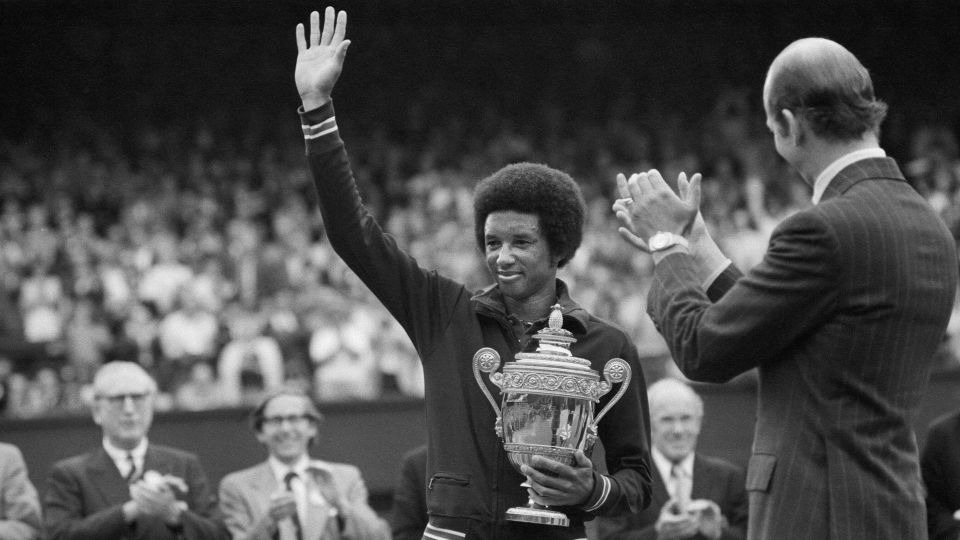
Arthur Ashe hits a slice serve with unerring accuracy, the ball arcing ever wider off the court.
Jimmy Connors, his heavily favored opponent and the defending champion, gets just enough of his racket on the ball to sneak it over the net.
But Ashe is already halfway up the court, pouncing on the short ball and punching the volley away with ease to clinch the Wimbledon title.
He holds his arms out briefly, before turning to his box with a clenched fist and then shaking Connors’ hand. It is a somewhat nonchalant reaction to one of the defining moments of Ashe’s career, and one of the most iconic moments in Wimbledon history.
But that response encapsulated Ashe’s personality on the court – cool, calm and collected, a man that rarely, if ever, looked flustered.
Fifty years have now passed since Ashe stunned Connors in four sets to become the first – and to this day only – Black man to win the Wimbledon gentlemen’s singles title, and the significance of his 1975 achievement only continues to grow with each passing edition of the championships.

In the last half century, MaliVai Washington is the only other Black player to reach the men’s singles final at Wimbledon, losing in 1996 to Dutchman Richard Krajicek.
To celebrate the 50th anniversary of Ashe’s historic achievement, Wimbledon organizers have a number of plans in place, including inviting his family as guests to the Royal Box on Centre Court.
There will also be a red phone box, an iconic London symbol, installed in the Wimbledon Queue, playing audio clips from Ashe’s victory as hundreds of fans line up every day for the chance to get a ticket into the grounds.
“He’s a legend. He’s a legend,” world No. 12 Frances Tiafoe, currently the highest-ranked Black male tennis player, said of Ashe. “Total icon on and off the court. Everything he meant, it was way bigger than him.
“It wasn’t just about him. Always paying it forward. He did a lot of things with action and not just talking. He’s a true role model, man, and a very, very similar situation to mine for sure.”
Birth of an icon
Born in July 1943 in Richmond, Virginia, Ashe was introduced to the sport when his father, Arthur Sr., became a caretaker for Brook Field Park in 1947, a segregated playground equipped with tennis courts.
As Ashe developed his skills, the opportunity to advance was stunted by segregation. For example, he was often shunned by the neighboring Byrd Park youth tournament because the public tennis courts were “Whites only.”
But Ashe persevered and was offered a full scholarship to attend UCLA. In 1963, he became the first Black American man to play on the United States Davis Cup team.
unknown content item
–
While he made his way up the ranks in men’s tennis, Ashe toed the line between remaining politically neutral to pacify his White colleagues and publicly condemning the racism faced by Black athletes.
But all that changed in 1968, when civil rights leader Martin Luther King Jr. and politician Robert F. Kennedy were assassinated two months apart.
Speaking about King’s assassination, Ashe said: “Being a Black American, I felt a sense of urgency that I want to do something, but I didn’t know what it was.”
Ashe began using his platform as one of America’s best tennis players to speak out, saying in a 1968 interview that “there’s really a mandate that you do something” if you’re Black and in the public eye.
It coincided with his rise as one of the best tennis players on the planet. Ashe won his maiden grand slam title at the 1968 US Open, becoming the first and only Black man to have won the singles tournament.
An Australian Open title in 1970 followed, before his incredible feat at Wimbledon five years later.
A lasting legacy
After retirement, Ashe continued to advocate for marginalized communities until his death in 1993. Ashe learned he was HIV-positive five years prior and publicly acknowledged his AIDS diagnosis in 1992, addressing the UN General Assembly on World AIDS Day.
“What I don’t want is to be thought of, when all is said and done … or remembered as (is) a great tennis player. I mean, that’s no contribution to make to society,” Ashe said in a documentary interview about his life.
To this day, Ashe’s legacy still stretches way beyond the court, inspiring a new generation of athlete activists – some of whom are playing at Wimbledon this year.

In 2020, after winning the Arthur Ashe Humanitarian Award, Tiafoe – who was knocked out of the second round at this year’s Wimbledon – penned an emotional letter to the late Ashe, calling the award “a tremendous honor and a massive responsibility.”
“I did not have much growing up,” Tiafoe wrote. “My parents are both immigrants from Sierra Leone. My dad was a janitor at a tennis facility in Maryland, and I was lucky to be around the sport from a young age, even if I did not have the money or opportunities a lot of other kids did.
“None of that stopped me from dreaming big. I pushed myself to the limit every day with a big smile on my face.
“That little kid with big dreams now has his name associated with yours. That is insane.”
CNN’s Ben Church and Sana Noor Haq contributed reporting.
For more CNN news and newsletters create an account at CNN.com
O que achou dessa notícia? Deixe um comentário abaixo e/ou compartilhe em suas redes sociais. Assim conseguiremos tornar o tênis cada vez mais popular!
Esta notícia foi originalmente publicada em:
Fonte original
Autor:
